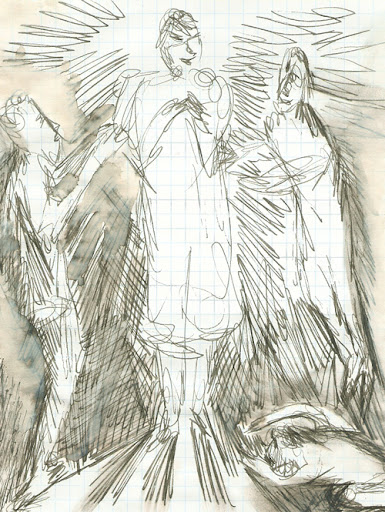- Guidance
- Universal truth & absolute truth
- Bliss & happiness, pain & sorrow
- Morality & moral pressure
- Before & after life
- Wonders & miracles
- Money
- Power
- Belonging & fulfillment
- Group dynamics
- Us & them
- Woman & man
- Ego & selflessness
- Mind & heart, logic & feeling
- Fear & temptation/reward
- Spiritual energy, holy energy, transformational power,...
Almost all of these pitfalls have been addressed in the previous posts, I feel. Some probably better, sharper than others, due to natural limitations of the author. The two pitfalls that have not been explicitly addressed, I think, are:
6. Wonders & miracles
13. Ego & selflessness
#####
About wonders & miracles, I think I can be short. From the personal perspective, they play on my wish to believe that there is a Special Purpose to my life, and that God is giving me Special Signs. From the Spiritual Movement's perspective, wonders and miracles are very handy to boost the Absolute Truth. If something extraordinary happens (and this occurs all the time of course) which we perceive as `good', then it is a Miracle, by His Grace etc. If something extraordinary but `bad' happens, well, suddenly no-one is so hot to claim it as `by His Grace'. Suddenly, the negative Event is due to our own negative tendencies, our failure to live up to His Standard.
I mean really. Let's not waste more words on it than this: any all-powerful Entity (God, Master, Leader, Spirit,...) is by the very meaning of the word `all-powerful' completely responsible for anything that happens in all the galaxies, in Existence (if you think that galaxies aren't enough). So in calling one thing a Miracle, and to blame the other on something else than the All-Powerful,...one certainly has one's work cut out trying to explain this to an unburdened mind.
Calling some things good and other things bad reflects our own morality. To me, this shows that the human concept of Absolute Morality doesn't go well together with the concept of an all-powerful Entity. But if it helps people to accept life's harshness, if it helps them develop mildness towards others, etc. then I don't feel like criticizing too much. If on the other hand it drives them towards fundamentalism, separatedness, all the other pitfalls, well then I think some counterweight is necessary.
#####
A final pitfall that seems to me abundantly present in spiritual movements concerns `ego', `selflessness', `selfishness'.
Many spiritual movements claim that the `ego' is responsible for our lack of spiritual progress. And they advocate a giving up of the ego, and living a selfless life full of sacrifice for others (and often of course also for the Leader/Movement).
In my not so humble opinion it would be too easy to dismiss all of this. The reader will recall my opinion that people generally do not act out of malice. But still, it hardly bears contemplation what people do to each other in this world. I cannot even really bear to write about it in any detail. And if I could name some common denominator in people's motives for being so `wolflike' to others, then I think I might call this `blind selfishness'. And how far is `blind selfishness' from `ego'?
So to me, this examining of the `ego' as a hindrance to a more spiritual way of living is not illogical. In my personal experience, it has even helped me get a better understanding of what it is I'm looking for `spiritually'.
So once again the question becomes: where is the pitfall in denouncing the `ego'? What is possibly harmful in advocating an ego-less, self-sacrificing way of life?
#####
The thing is, to me, that our `ego' is a very natural part of our being. It seems completely comparable to other natural parts of our being, such as bodily parts and functions, our capability to love, to analyze, to create, to destroy, to imagine, etc.
So the classic pitfall here appears to me to be this: since the `ego' can arguably be blamed for much of the world's misery, the solution must be to do away with it altogether!
It isn't necessary I think to elaborate on the obvious fallacy of that argument. But there are other pitfalls strongly associated with this `giving up of the ego'. Like stated earlier on this blog, it is the intricate combination of many pitfalls which -imnsho- can make it difficult to understand what one is being subjected to in a given spiritual movement.
#####
Giving up the `ego'...for many movements goes directly against self-reliance.
`The ego has the tendency to cling to its old habits. It will influence your mind, distract you from the Path. Many sages rose to a certain spiritual level, and no further, because they were foiled by their ego. To obtain a completely pure heart, you must surrender to One who has no ego at all. Put yourself completely in His hands, give up doubt (which is an instrument of the ego), cherish Faith. How to achieve the Goal? Do not do what you want to do, but give yourself over to His Wish. Work for the Movement, the Pyramid, the Mission. By doing so, your ego will diminish. Obedience is the key, when we start obeying Him completely, our ego will no longer have control over us. Now we reach a state of blissfull Divine Remembrance.'
Likewise, the ego can be blamed conveniently for any criticism of Movement, Method and/or Leader. In this way, serious and real criticism from sincere followers is often trivialized by the inner circle of the Movement's Pyramid. `Oh, it's just her ego you know. Shame really, after all our Leader has done for her. I pray to Him that this veil may be lifted from her mind.'.
#####
Even more dangerous in my eyes, is the tendency to work endlessly, to the detriment of normal daily life, for the Movement's Pyramid. After all, where are the checks-and-balances? If `ego' is bad, and if friends and family are just distractions from the Goal, and if working for the Mission is a `sure way of progress'...then is it so strange that some people are blinded by this combination into becoming zealous proselytizers, organizers, `spiritual counselors', fund raisers, ... etc.?
#####
So, at the near-ending of this blog, it seems to me that once again moderation and self-reliance are called for to avoid these pitfalls.
To me it seems a fact of life that I will be selfish to some extent in my life. By my living, other beings will suffer and even die. Every step I take will in fact kill many many organisms. I cannot avoid this, it is Nature. Imnsho, Nature dictates that I should take care of myself to a certain extent. Perhaps I can modify this extent to the point where others are hindered only a little, that would be nice. But to me, this doesn't change my fundamental responsibility of taking sufficient care of this person who is uniquely entrusted to me, namely ... myself. Who will prevent myself from overworking, from draining my physical and mental batteries, from under- or overnourishment, from falling into pitfalls of Spiritual Movements...if I don't do it myself?

